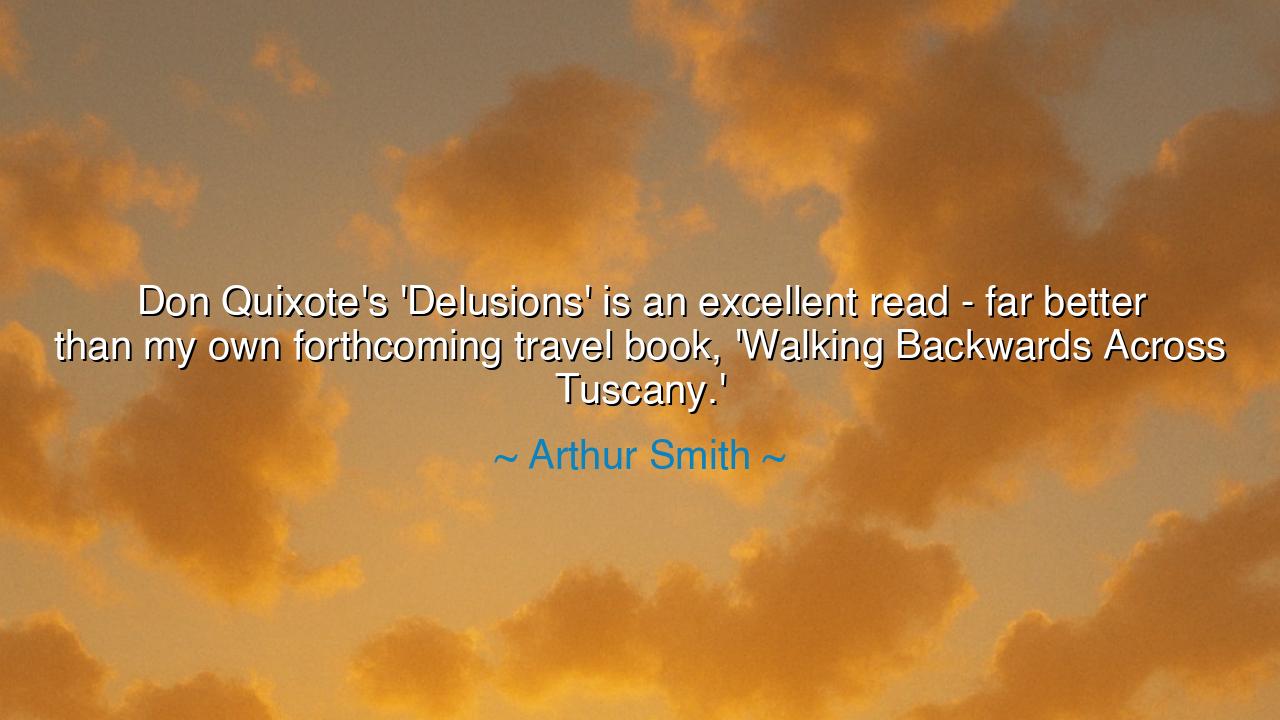
Don Quixote's 'Delusions' is an excellent read - far better than
Don Quixote's 'Delusions' is an excellent read - far better than my own forthcoming travel book, 'Walking Backwards Across Tuscany.'






“Don Quixote’s ‘Delusions’ is an excellent read – far better than my own forthcoming travel book, ‘Walking Backwards Across Tuscany.’” Thus spoke Arthur Smith, with wit and humility, placing his own work beneath the shadow of a timeless masterpiece. His words, though wrapped in humor, carry the weight of wisdom: that true greatness in art and literature lies not in competition, but in reverence, that the noble soul acknowledges when another’s vision towers above his own. It is in this humility, this laughter at himself, that Smith honors not only Cervantes’ immortal creation, but the eternal struggle of the human spirit between illusion and truth.
When Smith invokes Don Quixote, he calls forth one of the greatest figures of literature: the knight of La Mancha, who mistook windmills for giants, inns for castles, and simple peasants for princesses. These so-called delusions are more than madness; they are the reflection of a heart that dared to see the world not as it is, but as it could be. To read Don Quixote is to glimpse the nobility hidden within folly, the courage hidden within absurdity. And in calling it “an excellent read,” Smith reminds us that there is wisdom in madness, and truth in stories that appear ridiculous at first glance.
Yet Smith also contrasts Cervantes’ creation with his own: ‘Walking Backwards Across Tuscany.’ This title, whimsical and self-deprecating, suggests a journey undertaken with humor, perhaps even futility. In this contrast, he elevates Cervantes while making light of himself. This is no false modesty—it is the recognition that some works touch the eternal, while others remain personal and fleeting. To know one’s place in the great river of storytelling is itself an act of wisdom. For the arrogant man boasts of his works, but the wise man measures them against the great mountains and bows with gratitude.
History gives us examples of such humility. Consider Plutarch, who wrote of heroes greater than himself, not to outshine them but to preserve their deeds for generations. Or think of Dante Alighieri, who in his Divine Comedy placed himself within his own vision of the afterlife, yet still bowed in reverence before Virgil, the poet who had inspired him. Arthur Smith follows this same tradition, cloaking his humility in humor, but reminding us that the highest honor a writer can give is to recognize the greatness of those who came before.
There is also a deeper meaning in his choice of Don Quixote. For what is travel, what is storytelling, if not a kind of quixotic pursuit? To wander across Tuscany, even “walking backwards,” is itself a gesture of playfulness, of seeing the world differently, of embracing the absurd. In this, Smith’s work reflects the same spirit as Cervantes’: that life is not merely to be endured, but to be engaged with imagination, laughter, and courage, even when the world calls such things delusion. The traveler, like the knight, often appears foolish—but it is in that foolishness that wisdom is found.
The lesson for us is profound: embrace humility, honor greatness where you see it, but do not despise your own contribution, however small it may seem. Your work, your journey, your story may not be Cervantes’ Don Quixote, but it still has worth. Perhaps it will not echo through centuries, but it may bring joy, insight, or laughter to those who walk beside you. And in this, you too fulfill your purpose.
Practical action follows naturally: read the works of the greats, and let them inspire you, but do not be paralyzed by their brilliance. Create your own stories, live your own adventures, even if they feel like walking backwards through life. Celebrate your own path with humor and humility, and measure yourself not in fame, but in sincerity. For in the end, greatness is not only in those who write immortal works, but also in those who live their lives with courage, imagination, and laughter.
Thus, let Arthur Smith’s playful words remind us: honor the giants, but walk your own road. Even if the road winds backward, even if your tale seems small, walk it with joy. For life itself, like Don Quixote’s quest, may appear a delusion to some—but to those who dare, it becomes the greatest of adventures.






AAdministratorAdministrator
Welcome, honored guests. Please leave a comment, we will respond soon